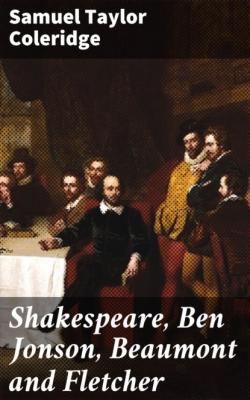Shakespeare, Ben Jonson, Beaumont and Fletcher. Samuel Taylor Coleridge
Читать онлайн.| Название | Shakespeare, Ben Jonson, Beaumont and Fletcher |
|---|---|
| Автор произведения | Samuel Taylor Coleridge |
| Жанр | Документальная литература |
| Серия | |
| Издательство | Документальная литература |
| Год выпуска | 0 |
| isbn | 4064066104399 |
“ The Custom Of The Country. ”
“ Rule A Wife And Have A Wife. ”
The Drama Generally, And Public Taste.
Unaccustomed to address such an audience, and having lost by a long interval of confinement the advantages of my former short schooling, I had miscalculated in my last Lecture the proportion of my matter to my time, and by bad economy and unskilful management, the several heads of my discourse failed in making the entire performance correspond with the promise publicly circulated in the weekly annunciation of the subjects to be treated. It would indeed have been wiser in me, and perhaps better on the whole, if I had caused my Lectures to be announced only as continuations of the main subject. But if I be, as perforce I must be, gratified by the recollection of whatever has appeared to give you pleasure, I am conscious of something better, though less flattering, a sense of unfeigned gratitude for your forbearance with my defects. Like affectionate guardians, you see without disgust the awkwardness, and witness with sympathy the growing pains, of a youthful endeavour, and look forward with a hope, which is its own reward, to the contingent results of practice—to its intellectual maturity.
In my last address I defined poetry to be the art, or whatever better term our language may afford, of representing external nature and human thoughts, both relatively to human affections, so as [pg 032] to cause the production of as great immediate pleasure in each part, as is compatible with the largest possible sum of pleasure on the whole. Now this definition applies equally to painting and music as to poetry; and in truth the term poetry is alike applicable to all three. The vehicle alone constitutes the difference; and the term “poetry” is rightly applied by eminence to measured words, only because the sphere of their action is far wider, the power of giving permanence to them much more certain, and incomparably greater the facility, by which men, not defective by nature or disease, may be enabled to derive habitual pleasure and instruction from them. On my mentioning these considerations to a painter of great genius, who had been, from a most honourable enthusiasm, extolling his own art, he was so struck with their truth, that he exclaimed, “I want no other arguments;—poetry, that is, verbal poetry, must be the greatest; all that proves final causes in the world, proves this; it would be shocking to think otherwise!”—And in truth, deeply, O! far more than words can express, as I venerate the Last Judgment and the Prophets of Michel Angelo Buonarotti—yet the very pain which I repeatedly felt as I lost myself in gazing upon them, the painful consideration that their having been painted in fresco was the sole cause that they had not been abandoned to all the accidents of a dangerous transportation to a distant capital, and that the same caprice, which made the Neapolitan soldiery destroy all the exquisite masterpieces on the walls of the church of Trinitado Monte, after the retreat of their antagonist barbarians, might as easily have made vanish [pg 033] the rooms and open gallery of Raffael, and the yet more unapproachable wonders of the sublime Florentine in the Sixtine Chapel, forced upon my mind the reflection: How grateful the human race ought to be that the works of Euclid, Newton, Plato, Milton, Shakespeare, are not subjected to similar contingencies—that they and their fellows, and the great, though inferior, peerage of undying intellect, are secured;—secured even from a second irruption of Goths and Vandals, in addition to many other safeguards, by the vast empire of English language, laws, and religion founded in America, through the overflow of the power and the virtue of my country;—and that now the great and certain works of genuine fame can only cease to act for mankind, when men themselves cease to be men, or when the planet on which they exist, shall have altered its relations, or have ceased to be. Lord Bacon, in the language of the gods, if I may use an Homeric phrase, has expressed a similar thought:—
“Lastly, leaving the vulgar arguments, that by learning man excelleth man in that wherein man excelleth beasts; that by learning man ascendeth to the heavens and their motions, where in body he cannot come, and the like; let us conclude with the dignity and excellency of knowledge and learning in that whereunto man's nature doth most aspire, which is immortality or continuance: for to this tendeth generation, and raising of houses and families; to this tend buildings, foundations, and monuments; to this tendeth the desire of memory, fame, and celebration, and in effect the strength of all other human desires. We see then how far the monuments of wit and learning are more durable than the monuments of power, or of the hands. For have not the verses of
